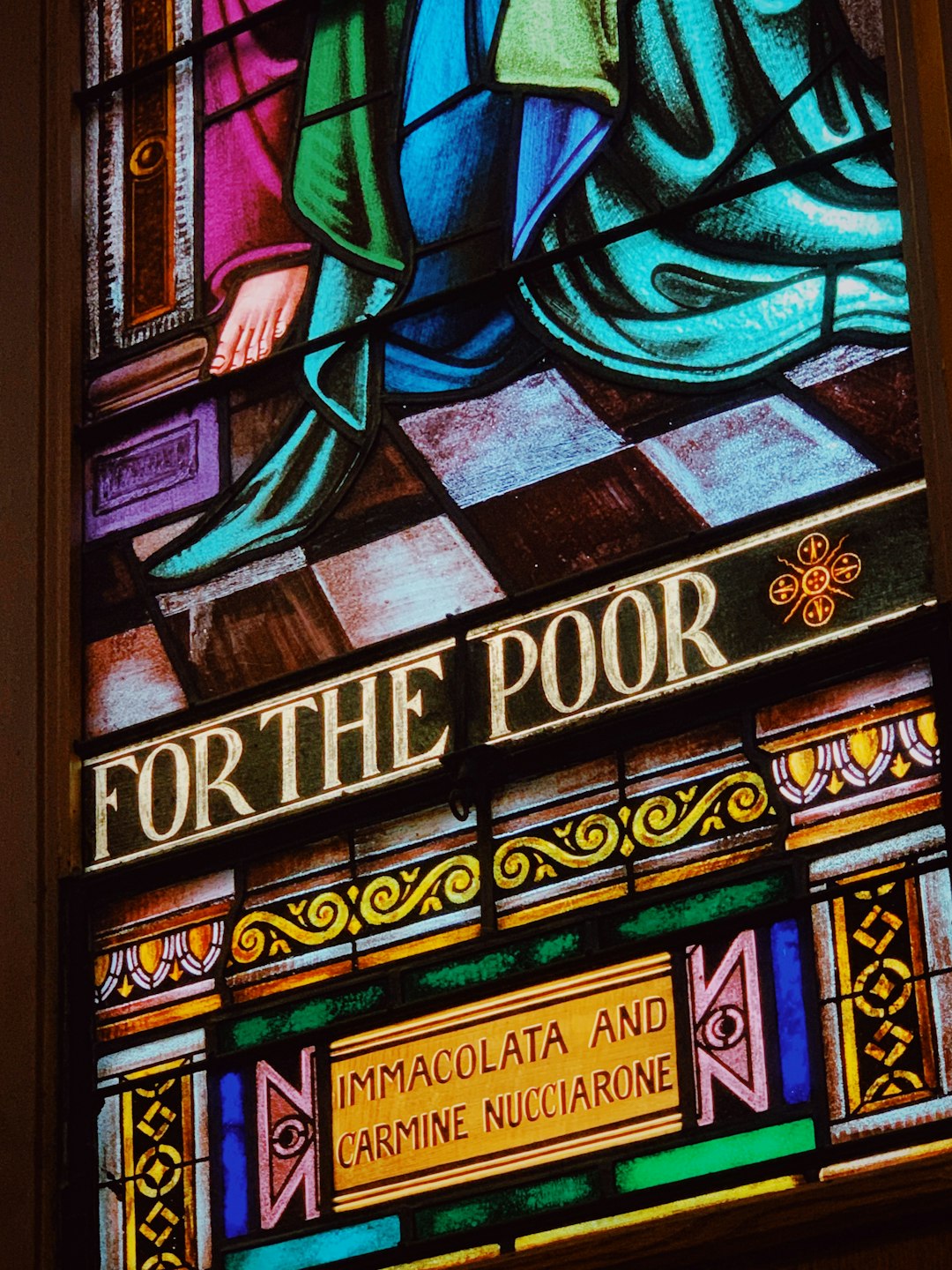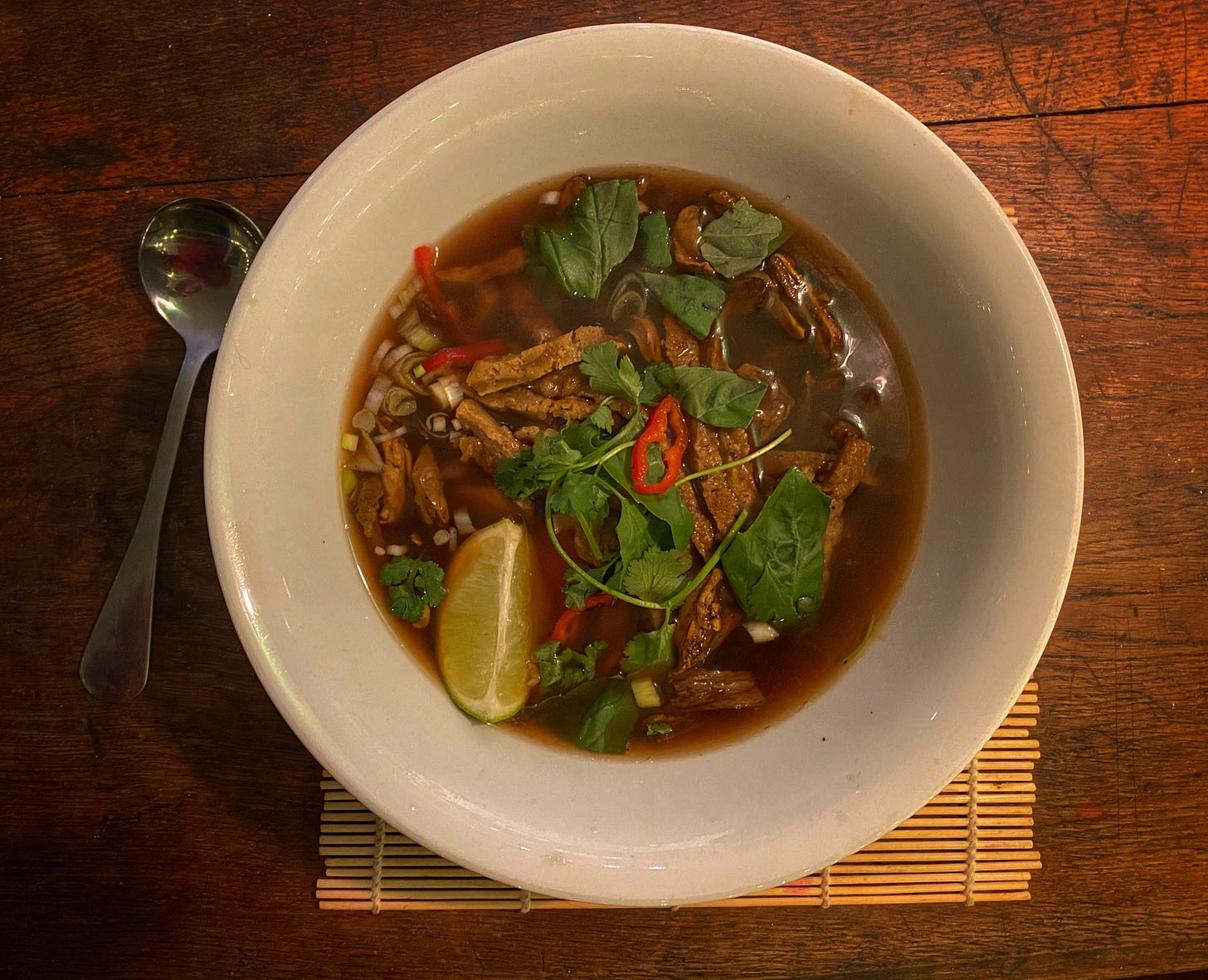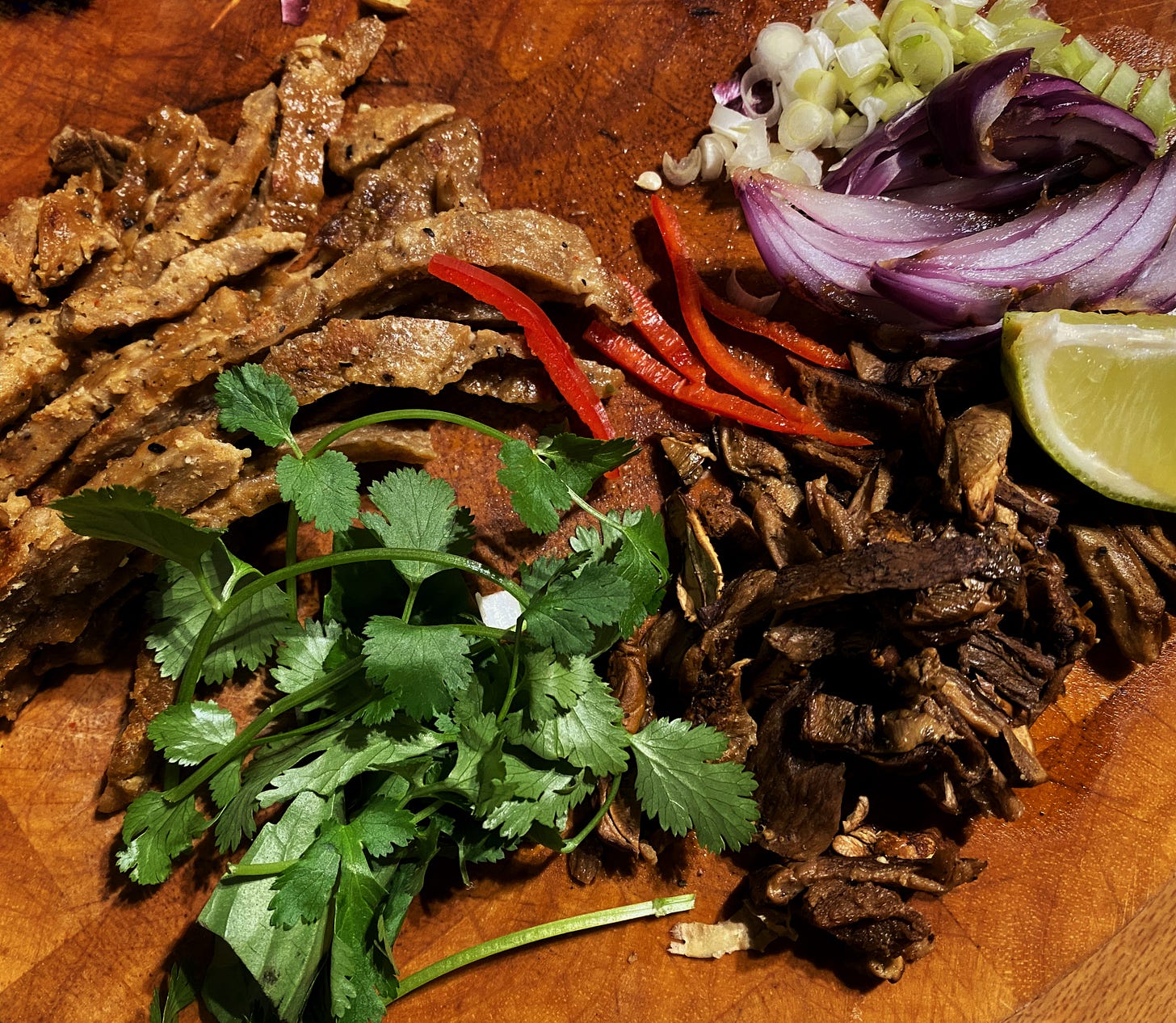Why the 'cost of living crisis' is costing much more than money
It's not just fuel and food - it's about how we feel and live
Like every smooth soundbite, ‘the cost of living crisis’ has now become a universally acknowledged truth. It’s snappier than ‘a combination of Brexit, the war in Ukraine, Covid and woeful government’, but the phrase neatly hands the problem over. It’s now nobody’s fault, its just a fact, like bad weather - a crisis has come upon us, and like ancient people waving our fists at the crop-destroying rains, there is no choice but to cope.
We are easily persuaded to forget that anyone might be to blame, and reminded that we’re all in it together, in our little microcosms of chilly homes and budget freezer meals. Instead of turning on the government for lying about the benefits of Brexit and exposing us to the bitter winds of the global economy, or Russia for threatening our supplies in their pointless war, or the government again, for failing the NHS and leaving businesses desperately understaffed with half the country either struck down with Covid (still) or on strike in the hope of a living wage, we are so worn down, after years of disaster, both national and personal, that we just accept it, like life prisoners taking another beating.

Social media is full of people saying ‘why is nobody marching about this? Why don’t they care?’ Some people are, but it seldom gets much coverage - it’s the old ‘a handful of placard-waving nutters’ defence. Then there’s the government’s attempts to ban protest, a seven-league-boot step towards the Far Right which is being grumbled mildly about but generally accepted. And mostly, the fact that we’re too weary, and we don’t believe it will make any difference.
We are the frogs in hot water, who have, over the past decade, gone from reasonably comfortable to having the organs boiled within our little green bodies. No wonder we’ve given up.
We’re aware, of course, that many of our parents and grandparents could afford a house of their own, a car, annual holidays, a well-loved pet … now, all of those things are luxuries. Few under 40s can pay for a house, children, marriage - they’re trapped in an eternal present, precariously renting or still at home, living day to day, unable to save and unable to plan a future. Older people who do own houses are increasingly aware that their money may well all be sucked into their later-life care, and there’ll be nothing left.

Of course, further back, pre-war life was grim for the poor, and the birth of the NHS, the dole and school dinners was a lifeline. But rather than looking back in horror on those days of shoeless children, and babies dying because their parents couldn’t afford a doctor, we seem to be returning to them, as if The Great Depression was a time of doughty stoicism and good sense rather than a mismanaged disaster that unnecessarily killed millions.
Worse, though, is the relentless focus on self help. This is a national and global problem, not an individual problem. Yet every suggestion for handling the horrific costs of fuel and food, and everything else, comes down to those cosy old Wartime favourites, scrimp and save. We’re constantly told that we can rescue ourselves by batch-cooking three basic lasagnes, or making a makeup brush holder out of an old milk bottle. Use vinegar to clean, re-use teabags, don’t go on holiday, camp in the back garden, don’t have a car, use public transport, don’t go out for meals, learn to cook better with your three carrots and two sprouting potatoes from the yellow sticker section.
All the little pleasures of life, which used to be widely available to the majority, are now reserved for the elite, while the rest of us microwave leftovers and tuck foil behind the radiators.

Bloggers, influencers and ‘experts’ are full of practical advice on budgeting. Use this app to photograph every receipt, re-use tired broccoli to make potato cakes, stab a tin because you can’t afford a tin opener (thanks, Jack Monroe), try this cheap, gim-crack home makeover because you’re only renting and can’t afford paint anyway… and if you don’t want to do these things, you deserve all you get. Those who take responsibility, scrimp, cancel holidays and follow ‘home hacks’ are the deserving poor; those who feel they should never have been put in this position and are failing, somehow, to ‘cope’ are the lazy, the feckless and the despised. Without noticing, we have returned to a cold, Victorian morality, where rather than judge our rulers for their manifest failings, greed and hypocrisy, we are encouraged to judge ourselves and each other for losing the ongoing Squid Game of being poor, when every week, the fresh challenge brings new expenses and less income.
The winners will be the happy householders subsisting on beans and meticulous darning as the world burns, and their reward will be … wait, there is no reward.

It’s understandable that we feel there’s little point in protest - because to date, this government has shown the public nothing but contempt for our reasonable requests. The Johnson premiership ushered in an era of absolute power, where lies, mismanagement and denial replaced any attempt at truth and accountability.
We could buckle down and save our teabags, eat 32p noodles and accept the economic floods that are washing us and everything we’ve tried to do away. Or we could gather any remaining strength we have left, and use it to campaign and vote for a new government. It may not change the world economy, but it will give us a chance. And that’s what we need now - far more than we need another clever budgeting hack.
LOCH-ED UP: My Life in Rural Scotland
Books are taking over and I’m out of control

When I moved to our cottage in rural Argyll, seven years ago, I’d previously done a massive cull of books. Over the decades, thousands must have passed through my hands; some read, some unread, some destined to be borrowed and never returned, some given away, and some sent to the great charity shop in the sky.
I’d still managed to retain several towering piles of the ones I couldn’t bear to part with, and though I did my utmost to fillet them so they’d fit in our modest two bedroom home, I didn’t quite achieve the full Kondo.
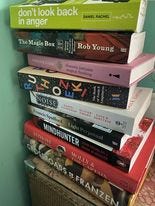
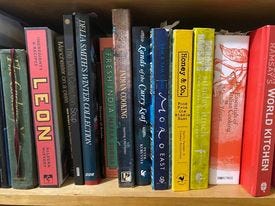


Imagine an ageing 1920s woman professor, with many interests, not so bothered about dust, a half-eaten apple balanced on a Dickens hardback, a tabby cat sleeping on a stack of dog-eared crime novels. This professor lives in an ancient tower, with circular shelving and a set of worn oak ladders to reach the more mystical books at the top. Sometimes, she’s too busy reading and making notes to hear the maid knocking gently with her supper on a tray. When she reaches distractedly for her cup of tea, another piles slides to the floor and remains there until she needs to look something up, or a beam of sunlight slices through the swirling dust motes to illuminate an interesting title.

Basically, I kept about that many books, give or take.
Andy, my patient husband, accepted this (though the phrase ‘fait accompli’ might have been muttered). I filled two Billy bookcases (sadly, no dusty tower yet) a large Art Deco cabinet, six wide shelves in the living room and began a To Be Read pile by the bed.
Seven years later, the TBR pile has grown like a creeping vine from the bedside table and snaked its way down the skirting board to the opposite wall. It’s now a two-tier pile. The kitchen chairs generally contain micro-heaps of whatever I’m simultaneously reading, and often the bath rack holds a slightly damp and cockled paperback. Occasionally, Andy will point out that there is no room, that there cannot be any more books, because there is nowhere to put them. Technically, I agree with him. Yet most weeks, I visit the local charity shops, just to see what there is. There’s generally something I desperately want to read. I also love a trip to Waterstones in Oban, to assess the new hardbacks. And really, it’s an affordable treat, and nothing makes me happier than a new novel from a favourite author. Besides, I now write crime novels myself, so its important research and vital to see what the competition is doing, obviously.

I also have a vast second-hand and vintage cookbook collection, from modern Middle Eastern to ancient copies of Fanny Craddock (hilarious), and can’t be parted from any of them. If I see a fabulous first edition of some obscure 1960s cookery fad, I’m hardly going to leave it in the shop, am I?
I know there’s a Japanese word for ‘buying more books than you could ever read’ (tsundoku, I Googled it), and I have sometimes wondered why I do this, as our tiny house groans under the weight of my personal lending library.
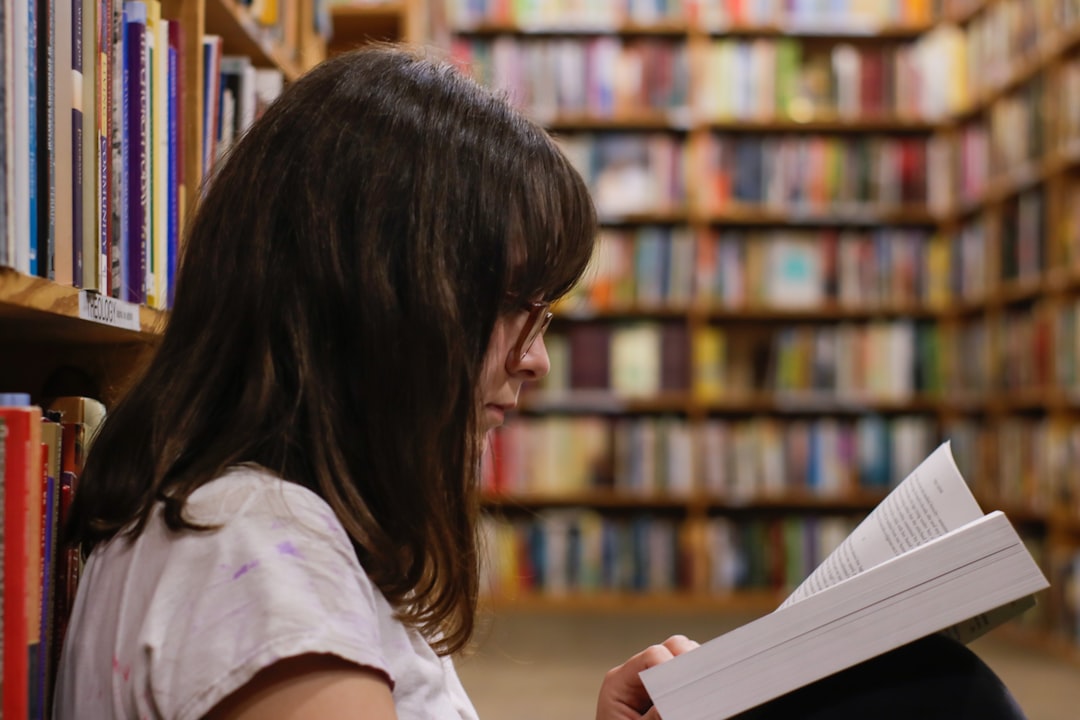
I suspect, like all addictions, it’s rooted in fear. Fear of emptiness, fear of missing out on a great story or brilliant characters or life-enhancing prose. Fear that I’ll suddenly find myself without a book and die of boredom and loneliness. I’ve been reading solidly all my life, and like people who live in terror of poverty so stockpile loo roll and biscuits, I live in fear of not being able to read.
I got a £50 book voucher for Christmas. Last week I went shopping in Waterstones, Manchester (it’s bigger than Oban) and bought eight books, which I then lugged back to Scotland on the train. Just in case. Currently, they’ve joined the TBR pile.
And then there’s my Kindle…
RECIPE OF THE WEEK: Vegetarian Pho
This is a vegetarian version of a Vietnamese Pho, a hot clear broth with exciting ingredients floating about. Normally, it features beef - I make mine with seitan, but you can easily use Quorn steak strips, just cut them into thin slices and fry in a teaspoon of hot oil.
Serves 2
Ingredients
1/2 a small onion (red if you have it)
2- 3 cm ginger
1 tbsp oil
2 spring onions, sliced into little discs
1/2 a lime
100g dried mushrooms, shiitake or porcini
1/2 a red chilli, finely sliced into strips
500ml of fake beef stock (OXO do this, or vegetable stock if you prefer)
2 cloves
4 cardamom seeds
2 star anise
1 cinnamon stick
150g rice noodles
handful of coriander
a few basil leaves
Method
1 Soak the mushrooms in 500ml boiling water for 30 min or until soft. Drain, chop, and keep the liquid.
2 Add the oil to a frying pan and turn to high. Slice the ginger into 3 long strips and lightly char on both sides - 2-3 mins. Add the onion and fry on the cut side till golden brown. Remove.
3 Add the steak strips/seitan, fry till crisp, and remove.
4 Sieve the mushroom liquid into a large pan, and add 500ml of the stock. Add the onion, ginger, half the chilli strips and a small muslin bag (Or a tea-ball, which I use ) containing the spices to the pan. (You can skip the bag but you may want to fish them all out later.)
5 Bring to the boil then turn down to simmer and cook for 40 mins.
6 Meanwhile, cook the rice noodles according to packet instructions and rinse in cold water.
7 Shortly before serving, add the mushrooms to the broth to heat through.
8 Place the rice noodles in the bowls, pour the liquid over, then pile the ‘beef’ on top with the remaining chilli, the spring onions, coriander and basil.
9 Serve with a fork and spoon.

